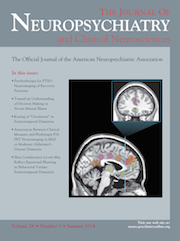To the Editor: Dopamine dysregulation syndrome (DDS) is a maladaptive behavioral pattern of excessive and compulsive seeking of dopamine replacement therapy (DRT) beyond what is necessary to control motor symptoms of Parkinson’s Disease (PD).
1 In addition to behaviors related to drug seeking, it can involve aggressive, hypomanic, impulsive, and compulsive behaviors associated with excessive use of DRT; and dysphoria and anxiety associated with withdrawal states. Although various management strategies have been explored, no clearly effective treatment has been established.
2,3 Recently, Sriram et al
4 published a consecutive case series of four patients successfully treated for DDS with valproic acid. We present an additional case of successful treatment using this approach.
The patient was a 62-year-old woman with a 10 year-history of PD and no past history of psychiatric or substance related disorders, who developed DDS in the year following addition of levodopa/carbidopa to her treatment regimen. She became preoccupied with the medication, hoarding it, and taking increasingly frequent doses despite developing uncomfortable dyskinesias. When her husband tried to limit her medication usage, she became impatient, anxious, irritable, and argumentative, at one point even reporting him to the police. She developed periods of mania, hallucinations, impulsive shopping, and compulsive arranging of picture frames, or “punding.” These alternated with periods of intense dysphoria, anhedonia, anxiety, panic attacks, and suicidal ideation. Prior to visiting our neuropsychiatry clinic, the patient had undergone psychiatric treatment, including two hospitalizations, involving multiple medication trials and ECT, with poor response. In addition, she had begun to overuse the prescribed psychotropics, which at the time of her visit, included sertraline, quetiapine, and lorazepam. On neuropsychiatric evaluation, she received the diagnosis of DDS, and arrangements were made for admission to our inpatient psychiatric unit with close neurologic consultation.
In the inpatient unit, the patient was started on divalproex sodium extended release, initially at a dose of 250 mg, with increase to 500 mg q.h.s. Her sinemet regimen was closely regulated on a fixed schedule. Her sertraline was stopped, quietiapine regulated, and lorazepam regulated and tapered. She and her husband received education regarding DDS and associated symptoms. Over the course of 2 weeks, the patient manifested a decrease in preoccupation with her medications and parkinsonian symptoms, and a stabilization of mood, affect, sleep, and behavior. No compulsive or impulsive behaviors were observed. She was discharged to home with her husband, who had bought a locked, programmable medication dispenser at the recommendation of the treatment team. On outpatient follow-up 2 weeks post-discharge, the patient displayed continued improvement. Her husband had stopped locking the medication dispenser, as she was no longer seeking extra doses. These gains were maintained at 1-month follow-up.
In conclusion, our case essentially represents a fifth consecutive instance of successful treatment of DDS with valproic acid, as reported by Sriram et al.
4 Although the mechanism(s) of action remain unclear,
4 this relatively rapid and striking improvement in an additional patient is heartening, given the extensive morbidity associated with this syndrome, and the lack of consistently effective existing treatments.

